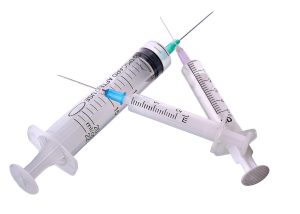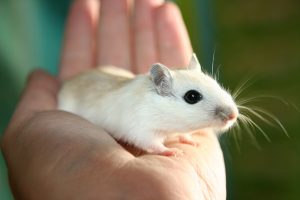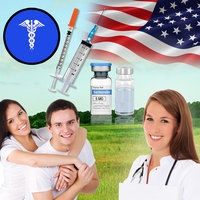 It’s definitely bizarre to think about. Testosterone is the hormone that promotes aggression and extreme masculinity, right? Partly.
It’s definitely bizarre to think about. Testosterone is the hormone that promotes aggression and extreme masculinity, right? Partly.
It’s more like...testosterone helps males to quickly adapt and switch their behaviors between prosocial and antisocial depending on the scenario they find themselves in, according to recent scientific research on the sex hormone and behavior.
The findings were published in the Proceedings of the Royal Society B journal and conducted by researchers at Emory University. They concluded that testosterone, the male sex hormone, can cause men to be more sociable and more friendly toward others.
Aubrey Kelly, one of the authors, says, “For what we believe is the first time, we’ve demonstrated that testosterone can directly promote nonsexual, prosocial behavior and aggression in the same individual.
It’s surprising because we typically think of testosterone as increasing sexual behaviors and aggression. But we’ve shown that it can have more nuanced effects, depending on the social context.”
Testosterone Can Affect the Production of Oxytocin
 The love hormone oxytocin was also found to have a connection to testosterone, with testosterone affecting the activity of oxytocin cells.
The love hormone oxytocin was also found to have a connection to testosterone, with testosterone affecting the activity of oxytocin cells.
Oxytocin is usually associated with sexual and romantic bonding and the bonding between mother and child after birth.
The study's authors were trying to understand better how different hormones function in the brain, using animal models for now, to help an animal change its behavior based on the social situation it finds itself in.
Most people think that testosterone promotes aggressive behavior, and they aren’t wrong. The research also supports this as well. But study authors were questioning whether testosterone could also increase prosocial behaviors instead of just increasing antisocial ones, such as hostility.
They believed that the sex hormone could possibly boost positive social reactions in situations where this would be socially appropriate.
The animal models used were Mongolian gerbils. These rodents actually create long-lasting mated pairs and raise their young together, similar to humans. The male gerbils do become more violent during the mating season and will defend their territory.
Still, they will also cuddle their females and display protective behavior toward the young once the female gerbil is pregnant. Who knew we had so much in common with gerbils? We are related, after all…
Testosterone Injection Produced More Cuddling Behavior
 Now for the experiments. A male and female gerbil were introduced to each other. They developed a pair bond, and the female got pregnant.
Now for the experiments. A male and female gerbil were introduced to each other. They developed a pair bond, and the female got pregnant.
Awww. Once this happened, the male became cuddlier toward the female. Next, the males were given testosterone injections. The researchers thought that this would reduce the cuddling behaviors by the males; however, “Instead, we were surprised that a male gerbil became even more cuddly and prosocial with his partner. He became like ‘super partner.’”
A week later, the scientists performed something they called the “resident-intruder test.” The males who had been given a testosterone injection the previous week said bye-bye to their females, who were taken from the cage.
He was now alone. Next, an unknown male was put in the cage. You would think that the original male would get mad and try to chase the intruder out, biting and fighting with it. “Instead, the resident males that had previously been injected with testosterone were more friendly to the intruder.” Surprise, surprise!
Testosterone Enhances Context-Appropriate Social Behavior
This more cordial behavior was quickly switched back to aggressiveness when the resident males were given another testosterone injection. Kelly says, “It was like they suddenly woke up and realized they weren’t supposed to be friendly in that context.”
The scientists believe that the surge of testosterone in the males when with their female partners rapidly increased the more prosocial and positive social reactions since that was what the context called for at the time, while also priming them to act more prosocially in the near future, even when the context of the social situation changed (the introduction of the male and removal of their mate).
The second injection of testosterone and subsequent surge prompted them to act more “appropriately” towards the given social situation – getting the male intruder out and being aggressive/antisocial.
 Kelly says, “It appears that testosterone enhances context-appropriate behavior. It seems to play a role in amplifying the tendency to be cuddly and protective or aggressive.”
Kelly says, “It appears that testosterone enhances context-appropriate behavior. It seems to play a role in amplifying the tendency to be cuddly and protective or aggressive.”
The hormone assists the animals in rapidly switching between prosocial and antisocial responses as the environment changes around them. In the wild, the gerbil would likely experience a surge of testosterone when another male gerbil would enter his territory.
In terms of their findings involving oxytocin, they found that the male gerbils injected with testosterone also exhibited higher oxytocin activity in the brain during their time with the female when compared to the males who were not injected.
Kelly says, “Our results suggest that one of the reasons for this overlap [testosterone and oxytocin activity in the brain] may be so they can work together to promote prosocial behavior.”
Contact Us For A Fast And Professional Response

- Cheyenne Sermorelin for HGH Deficiency [Last Updated On: April 6th, 2023] [Originally Added On: November 3rd, 2018]
- Milwaukee Sermorelin for HGH Deficiency [Last Updated On: April 19th, 2023] [Originally Added On: November 3rd, 2018]
- Madison Sermorelin for HGH Deficiency [Last Updated On: February 14th, 2023] [Originally Added On: November 3rd, 2018]
- Green Bay Sermorelin for HGH Deficiency [Last Updated On: May 10th, 2023] [Originally Added On: November 3rd, 2018]
- Charleston Sermorelin for HGH Deficiency [Last Updated On: February 26th, 2023] [Originally Added On: November 3rd, 2018]
- Vancouver Sermorelin for HGH Deficiency [Last Updated On: October 2nd, 2023] [Originally Added On: November 3rd, 2018]
- Tacoma Sermorelin for HGH Deficiency [Last Updated On: May 28th, 2023] [Originally Added On: November 3rd, 2018]
- Spokane Sermorelin for HGH Deficiency [Last Updated On: March 23rd, 2023] [Originally Added On: November 3rd, 2018]
- Seattle Sermorelin for HGH Deficiency [Last Updated On: May 16th, 2023] [Originally Added On: November 3rd, 2018]
- Bellevue Sermorelin for HGH Deficiency [Last Updated On: March 6th, 2023] [Originally Added On: November 3rd, 2018]
- Virginia Beach Sermorelin for HGH Deficiency [Last Updated On: March 23rd, 2023] [Originally Added On: November 3rd, 2018]
- Richmond Sermorelin for HGH Deficiency [Last Updated On: April 23rd, 2023] [Originally Added On: November 3rd, 2018]
- Portsmouth Sermorelin for HGH Deficiency [Last Updated On: February 18th, 2023] [Originally Added On: November 3rd, 2018]
- Norfolk Sermorelin for HGH Deficiency [Last Updated On: October 12th, 2023] [Originally Added On: November 3rd, 2018]
- Newport News Sermorelin for HGH Deficiency [Last Updated On: January 7th, 2023] [Originally Added On: November 3rd, 2018]
- Hampton Sermorelin for HGH Deficiency [Last Updated On: April 17th, 2023] [Originally Added On: November 3rd, 2018]
- Chesapeake Sermorelin for HGH Deficiency [Last Updated On: March 27th, 2023] [Originally Added On: November 3rd, 2018]
- Arlington, Virginia Sermorelin for HGH Deficiency [Last Updated On: July 24th, 2023] [Originally Added On: November 3rd, 2018]
- Alexandria Sermorelin for HGH Deficiency [Last Updated On: May 27th, 2023] [Originally Added On: November 3rd, 2018]
- Montpelier Sermorelin for HGH Deficiency [Last Updated On: May 2nd, 2023] [Originally Added On: November 3rd, 2018]
- West Valley City Sermorelin for HGH Deficiency [Last Updated On: December 27th, 2023] [Originally Added On: November 3rd, 2018]
- West Jordan Sermorelin for HGH Deficiency [Last Updated On: April 27th, 2023] [Originally Added On: November 3rd, 2018]
- Salt Lake City Sermorelin for HGH Deficiency [Last Updated On: July 11th, 2023] [Originally Added On: November 3rd, 2018]
- Provo Sermorelin for HGH Deficiency [Last Updated On: March 11th, 2023] [Originally Added On: November 4th, 2018]
- Wichita Falls Sermorelin for HGH Deficiency [Last Updated On: May 26th, 2023] [Originally Added On: November 4th, 2018]
- Waco Sermorelin for HGH Deficiency [Last Updated On: February 19th, 2023] [Originally Added On: November 4th, 2018]
- San Antonio Sermorelin for HGH Deficiency [Last Updated On: November 5th, 2023] [Originally Added On: November 4th, 2018]
- Round Rock Sermorelin for HGH Deficiency [Last Updated On: November 11th, 2023] [Originally Added On: November 4th, 2018]
- Richardson Sermorelin for HGH Deficiency [Last Updated On: February 7th, 2023] [Originally Added On: November 4th, 2018]
- Plano Sermorelin for HGH Deficiency [Last Updated On: July 18th, 2023] [Originally Added On: November 4th, 2018]
- Pasadena Sermorelin for HGH Deficiency [Last Updated On: September 7th, 2023] [Originally Added On: November 4th, 2018]
- Midland Sermorelin for HGH Deficiency [Last Updated On: November 22nd, 2023] [Originally Added On: November 4th, 2018]
- Mesquite Sermorelin for HGH Deficiency [Last Updated On: October 22nd, 2023] [Originally Added On: November 4th, 2018]
- McKinney Sermorelin for HGH Deficiency [Last Updated On: December 21st, 2023] [Originally Added On: November 4th, 2018]
- McAllen Sermorelin for HGH Deficiency [Last Updated On: February 17th, 2023] [Originally Added On: November 4th, 2018]
- Lubbock Sermorelin for HGH Deficiency [Last Updated On: September 10th, 2023] [Originally Added On: November 4th, 2018]
- Lewisville Sermorelin for HGH Deficiency [Last Updated On: September 7th, 2023] [Originally Added On: November 4th, 2018]
- Laredo Sermorelin for HGH Deficiency [Last Updated On: August 10th, 2023] [Originally Added On: November 4th, 2018]
- Killeen Sermorelin for HGH Deficiency [Last Updated On: February 23rd, 2023] [Originally Added On: November 4th, 2018]
- Irving Sermorelin for HGH Deficiency [Last Updated On: April 29th, 2023] [Originally Added On: November 4th, 2018]
- Houston Sermorelin for HGH Deficiency [Last Updated On: October 2nd, 2023] [Originally Added On: November 4th, 2018]
- Grand Prairie Sermorelin for HGH Deficiency [Last Updated On: May 18th, 2023] [Originally Added On: November 4th, 2018]
- Garland Sermorelin for HGH Deficiency [Last Updated On: March 7th, 2023] [Originally Added On: November 4th, 2018]
- Fort Worth Sermorelin for HGH Deficiency [Last Updated On: October 28th, 2023] [Originally Added On: November 4th, 2018]
- El Paso Sermorelin for HGH Deficiency [Last Updated On: January 8th, 2023] [Originally Added On: November 4th, 2018]
- Denton Sermorelin for HGH Deficiency [Last Updated On: February 21st, 2023] [Originally Added On: November 4th, 2018]
- Dallas Sermorelin for HGH Deficiency [Last Updated On: April 30th, 2023] [Originally Added On: November 4th, 2018]
- Corpus Christi Sermorelin for HGH Deficiency [Last Updated On: July 30th, 2023] [Originally Added On: November 4th, 2018]
- Carrollton Sermorelin for HGH Deficiency [Last Updated On: February 4th, 2023] [Originally Added On: November 4th, 2018]
- Brownsville Sermorelin for HGH Deficiency [Last Updated On: April 10th, 2023] [Originally Added On: November 4th, 2018]
- Beaumont Sermorelin for HGH Deficiency [Last Updated On: November 27th, 2023] [Originally Added On: November 4th, 2018]
- Austin Sermorelin for HGH Deficiency [Last Updated On: May 13th, 2023] [Originally Added On: November 4th, 2018]
- Arlington Sermorelin for HGH Deficiency [Last Updated On: April 16th, 2023] [Originally Added On: November 4th, 2018]
- Amarillo Sermorelin for HGH Deficiency [Last Updated On: May 14th, 2023] [Originally Added On: November 4th, 2018]
- Abilene Sermorelin for HGH Deficiency [Last Updated On: December 26th, 2023] [Originally Added On: November 4th, 2018]
- Nashville Sermorelin for HGH Deficiency [Last Updated On: March 16th, 2023] [Originally Added On: November 4th, 2018]
- Murfreesboro Sermorelin for HGH Deficiency [Last Updated On: May 18th, 2023] [Originally Added On: November 4th, 2018]
- Memphis Sermorelin for HGH Deficiency [Last Updated On: November 24th, 2023] [Originally Added On: November 4th, 2018]
- Knoxville Sermorelin for HGH Deficiency [Last Updated On: July 16th, 2023] [Originally Added On: November 4th, 2018]
- Clarksville Sermorelin for HGH Deficiency [Last Updated On: July 14th, 2023] [Originally Added On: November 4th, 2018]
- Chattanooga Sermorelin for HGH Deficiency [Last Updated On: May 15th, 2023] [Originally Added On: November 4th, 2018]
- Sioux Falls Sermorelin for HGH Deficiency [Last Updated On: March 5th, 2023] [Originally Added On: November 4th, 2018]
- Columbia Sermorelin for HGH Deficiency [Last Updated On: April 25th, 2023] [Originally Added On: November 4th, 2018]
- Charleston, South Carolina Sermorelin for HGH Deficiency [Last Updated On: October 13th, 2023] [Originally Added On: November 4th, 2018]
- Providence Sermorelin for HGH Deficiency [Last Updated On: April 23rd, 2023] [Originally Added On: November 4th, 2018]
- Pittsburgh Sermorelin for HGH Deficiency [Last Updated On: November 10th, 2023] [Originally Added On: November 4th, 2018]
- Philadelphia Sermorelin for HGH Deficiency [Last Updated On: May 5th, 2023] [Originally Added On: November 4th, 2018]
- Erie Sermorelin for HGH Deficiency [Last Updated On: August 21st, 2023] [Originally Added On: November 4th, 2018]
- Allentown Sermorelin for HGH Deficiency [Last Updated On: February 2nd, 2023] [Originally Added On: November 4th, 2018]
- Salem Sermorelin for HGH Deficiency [Last Updated On: September 25th, 2023] [Originally Added On: November 4th, 2018]
- Portland Sermorelin for HGH Deficiency [Last Updated On: June 29th, 2023] [Originally Added On: November 4th, 2018]
- Gresham Sermorelin for HGH Deficiency [Last Updated On: March 22nd, 2023] [Originally Added On: November 4th, 2018]
- Eugene Sermorelin for HGH Deficiency [Last Updated On: April 30th, 2023] [Originally Added On: November 4th, 2018]
- Tulsa Sermorelin for HGH Deficiency [Last Updated On: September 18th, 2023] [Originally Added On: November 4th, 2018]
- Oklahoma City Sermorelin for HGH Deficiency [Last Updated On: August 22nd, 2023] [Originally Added On: November 4th, 2018]
- Norman Sermorelin for HGH Deficiency [Last Updated On: March 23rd, 2023] [Originally Added On: November 4th, 2018]
- Toledo Sermorelin for HGH Deficiency [Last Updated On: January 29th, 2023] [Originally Added On: November 4th, 2018]
- Dayton Sermorelin for HGH Deficiency [Last Updated On: July 2nd, 2023] [Originally Added On: November 4th, 2018]
- Columbus, Ohio Sermorelin for HGH Deficiency [Last Updated On: July 25th, 2023] [Originally Added On: November 4th, 2018]
- Cleveland Sermorelin for HGH Deficiency [Last Updated On: April 29th, 2023] [Originally Added On: November 4th, 2018]


















